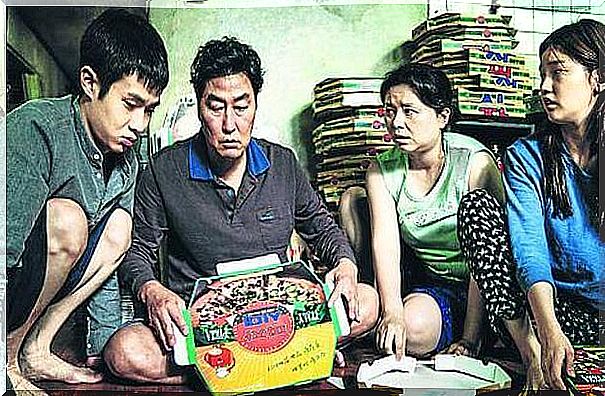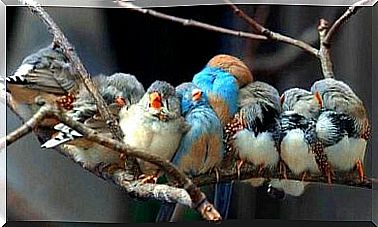Parasites: When Dignity Is Much More Important Than Money

Bong Joon-ho returned to Cannes with Parasite. Not for Pedro Almodóvar, Quentin Tarantino or Xavier Dolan. The golden palm was for his Parasites , to which the world criticism has surrendered.
Parasites is a portrait of an amoral family in a society where the division between rich and poor is increasingly abysmal. A sharp critique of South Korean society that transcends many of the themes already developed in his previous works. In Parasites there is mastery of the mix of genres and the splendor of a scandalously striking staging, almost totally confined within the 4 walls of a sumptuous house.
There is an inhuman side to this movie, almost unbearable if it weren’t for the black humor and playful aspect of the film. Parasites is an XXL social comedy, with its jokes about the news from its neighbor North Korea. A visual richness with a peculiar sense that confirms the power of a great filmmaker.

Parasites : from misery to glamor all it takes is a deception
Parasites tells the story of two families that in theory should never have met: a poor family (the Kims) and a rich family (the Parks). The four members of the poor family, two adults and two teenagers, live in an apartment on a former mezzanine in a popular district in Seoul. Their mood is good despite the somewhat precarious conditions in which they live.
When we meet them, they are busy looking for a place in their hut to capture their neighbor’s WiFi signal, suddenly cut off. It will be understood very quickly that this family has appreciated the virtues of the system and knows how to take advantage of certain tricks.
To say that the Kim family is struggling to make ends meet is an understatement. They survive by hacking into surrounding cellular networks, alternating odd jobs and petty fraud. His luck changes when a friend, on the eve of emigrating to the United States, proposes to Ki-woo, the eldest son, to succeed him as an English teacher to teach a girl in a wealthy home.
The work of which the rest of the family will parasitize
Once the son’s job is secured, the Kim clan implements a strategy for its diverse members to integrate into the Park family in the place of the domestic worker predecessors. These workers, one by one, receive their termination notice before they understand what is happening. In order not to arouse suspicion, the Kims hide their relationship.
The recommendations of each other will be necessary, without the Park family being aware that it is hiring all the members of a family without training and work experience. Once again, the strength of the recommendations and of lying on the resume outweighs the importance of getting a good job than dedication, struggle, or effort. All a reflection of the current world in which we live.
Parasites : the abyss of social classes
A recurring theme in Bong Joon-ho’s filmography is differences in social class. In Parasites , the director criticizes a system that pushes people to make radical decisions. The first scene in Parasites appears to be an empty bird cage covered in socks in front of a window that is partially below street level.
Instead, in this apartment, all dreams of escape have been extinguished. The socks reinforce the connection to the ground while they are in the cage. The low advantage it gives to the street indicates exclusion. Stuck underground, the Kims writhe over the depths to which they have sunk, for their lack of connection.
However, there are people even shorter than the Kims, people whose existence is completely underground, who smell worse than them, of mold and excrement, whom the Kims must now bury just as they were buried. Other underground stairs will appear much more terrifying than those that all the members of the Kim family descend one night of floods. The use of the stairs has a great symbolism in this movie.
From joke to tragedy
The first half of Parasites is easily seen. We follow all these endearing characters despite their flaws and their choices beyond all morals. Humor works great and scams are delicious. But, little by little, the humor fades to make room for a darker atmosphere, despite the slight touches of absurdity that never leave the film.
The poor family comments on how incredibly “nice” the lady of the Park house is. They realize that it is easy to be nice and have a good mood with an inexpensive mattress that supports you. There seems to be an aura of dignity, joy, respect and reason in everything that surrounds the Park family.
The further the film progresses, the more raw it becomes, reaching the point of violence. After a rain shower causes sewers to overflow and symbolically flood the Kim basement apartment; The family is forced to perform the next day at the Park’s fancy party honoring Native American Indians celebrating the Park’s son’s birthday.
The dehumanization of the poor, the servant
Hiding under a table, the Kims listen as Mr. Park talks about Mr. Kim’s good qualities. They describe him as a good man, someone who looks like he’s going to go overboard, but never really does.
They describe its characteristic smell, that “wet cloth” smell of people taking the subway. In those words, it follows that for this family, and surely for a part of Korean society, the poor are human beings, but in a different way from the rich.

For the upper classes, their power lies not so much in having money as in clearly differentiating themselves from people whom they consider, in part, despicable and expendable. All that cruel condescension settles within the entire Kim family.
The father, dressed in Indian feathers, to surprise at the party and without any empathy on the part of this successful family, experiences a sense of madness relative to his dignity. After that, a class revenge begins. A revenge of every father who does not tolerate the humiliation experienced by those who are like him.
After watching this movie, one does not stop wondering: Who are the real parasites? The poor who join the rich or the rich who suck the marrow of the poor? Or is the system itself the parasite, drawing its energy from the turbulent interaction between rich and poor?









